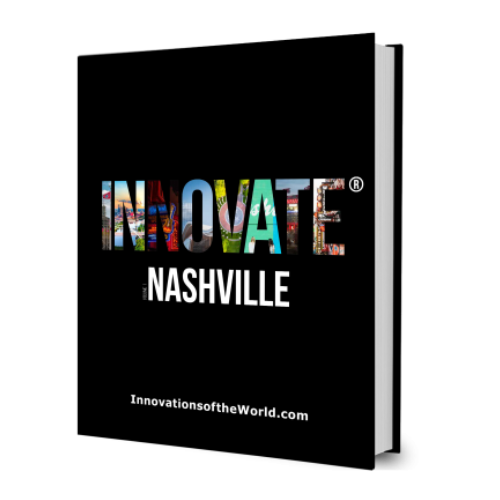Founded in Nashville in 1890 by Susan Heron and Ida B. Hood–two female school teachers–Belmont University has been defying conventional expectations of higher education and serving as an incubator of innovation ever since. Today, the University is comprised of nearly 9,000 students from every U.S. state and 33 countries. Nationally ranked and consistently recognized by U.S. News & World Report for innovation, Belmont offers more than 127 areas of undergraduate study, 41 master’s programs and eight doctoral degrees.

Following Dr. Greg Jones’ arrival as the Institution’s new president in June 2021, Belmont launched a new mission, a fresh vision and an ambitious Strategic Trajectory to 2030 that will guide the University’s course for the next decade. With a focus on whole-person formation and data-informed social innovation, Belmont is committed to developing diverse leaders of character who are equipped to solve the world’s complex problems and support human flourishing for all people.

“It’s an exciting time to be in higher education,” said President Greg Jones. “The academy has long been a place where people of differing perspectives, backgrounds and experiences can work together toward action that will lead to true impact. That’s what we’re about at Belmont–we seek to be an innovation incubator where ideas spur actions and lives are changed. I’m energized by the chance to be among leading minds who are working in this space to provide incredible educational opportunities to our students and leverage all we’ve been given to help people and communities thrive.
An institution with this posture–one that is focused on supporting communities and using its resources to impact the world–can have a significant impact. Belmont is illustrating this commitment through new programs and initiatives all across campus.
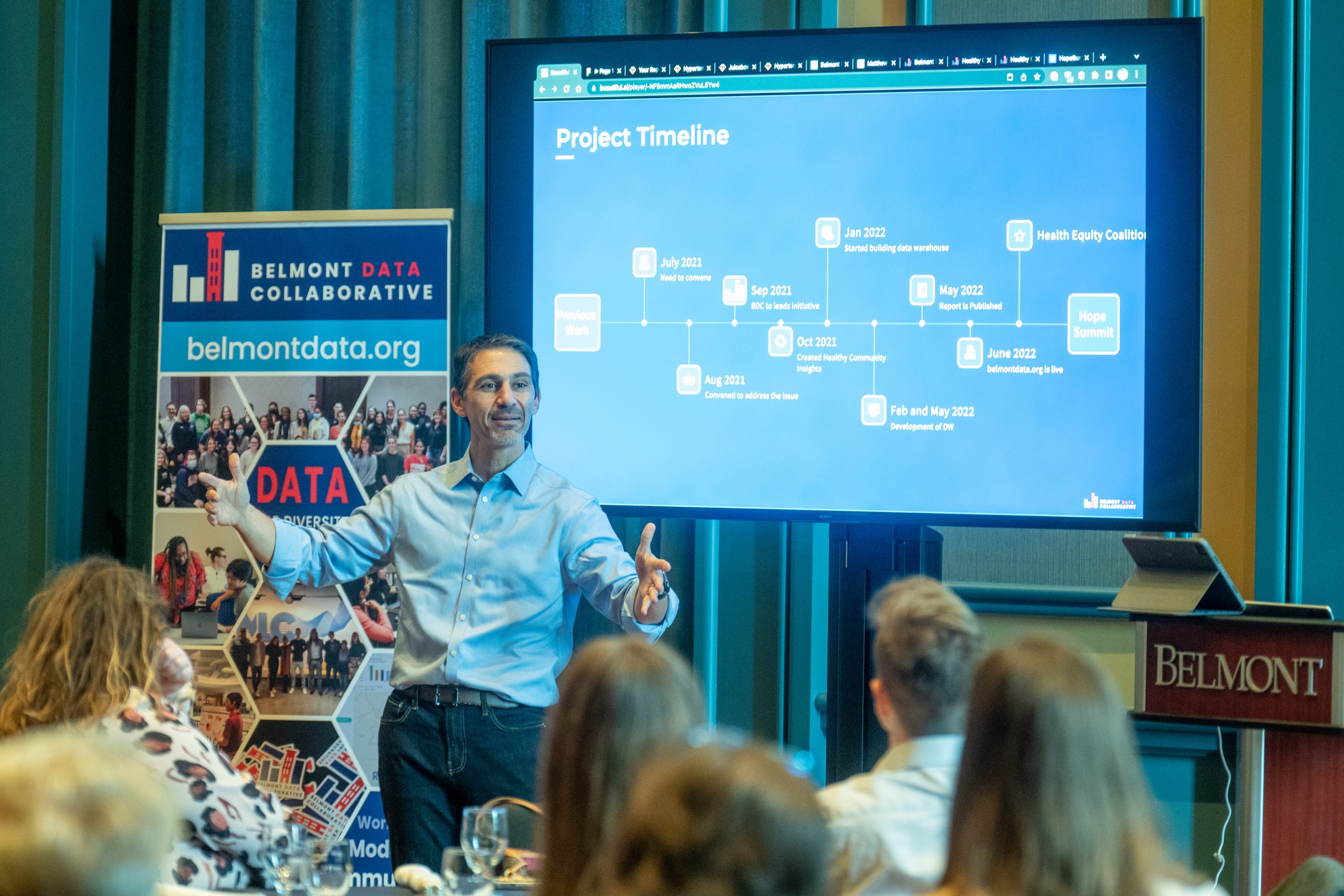
BELMONT DATA COLLABORATIVE: Innovation Through Data
In August 2021, the University announced the creation of the Belmont Data Collaborative (BDC) and its intent to invest $60 million throughout the next five years in data initiatives. Led by Executive Director Dr. Charlie Apigian, BDC’s purpose and scope is broad: to serve Belmont students and working professionals by delivering curricula and programming to help fill the ever-evolving need for data skills in nearly every workforce environment and use data to develop creative solutions to growing and significant community challenges.
At its core, BDC infuses data skills into every facet of Belmont’s mission and serves as a trusted data partner for organizations and communities in Nashville and across the state of Tennessee. In its first year, the BDC team has forged partnerships with numerous organizations to make a significant impact quickly, beginning with hypertension in Nashville.
The Data Warehouse, which has been done in conjunction with many community partners, is focused on gathering and analyzing publicly available data to develop creative solutions to complex social problems. The Hypertension Project was the first to leverage data gathered by and housed in the new Data Warehouse, Tennessee’s first hub for a variety of publicly available state-wide data.
After gathering and analyzing health data, the BDC team released its initial report on hypertension and related health inequalities across Nashville–data that is already leading to innovative solutions and partnerships that will support human flourishing. Moving forward, BDC will continue these efforts and expand its focus to harness data and innovation to tackle other critical community challenges including mental health and wellbeing, affordable housing and human trafficking.
We are committed to solving societal problems,” said Apigian. And data is one of the best resources we have to accomplish that goal. As data tells the story of what is holding our communities back, we can inform innovative, meaningful, life-giving change. And that’s really significant work that we’re grateful to have the chance to take on.”
BELMONT INNOVATION LABS FOR SOCIAL IMPACT: Innovation Through Partnership
The newly created (launched in early 2022) Belmont Innovation Labs is focused on equipping people and organizations with the tools to design, develop and deploy collaborative responses to our most pressing social and community challenges.
The Labs accomplish this mission by mobilizing and resourcing social innovation ecosystems through leadership development, translational research, strategic convening and creative storytelling. When harnessed and aligned, ecosystems (which should include organizations like universities!) can generate lasting positive impact in the lives and communities that need it most.
In October 2022, Belmont and the Innovation Labs hosted the University’s inaugural Hope Summit, a multi-day event focused on innovation and creativity to help regions thrive. With entrepreneurs, investors, philanthropists, researchers, academicians, students and more engaging creatively on how to leverage innovation and resources to drive to thriving. The time provided many opportunities for conversation to lead to action.
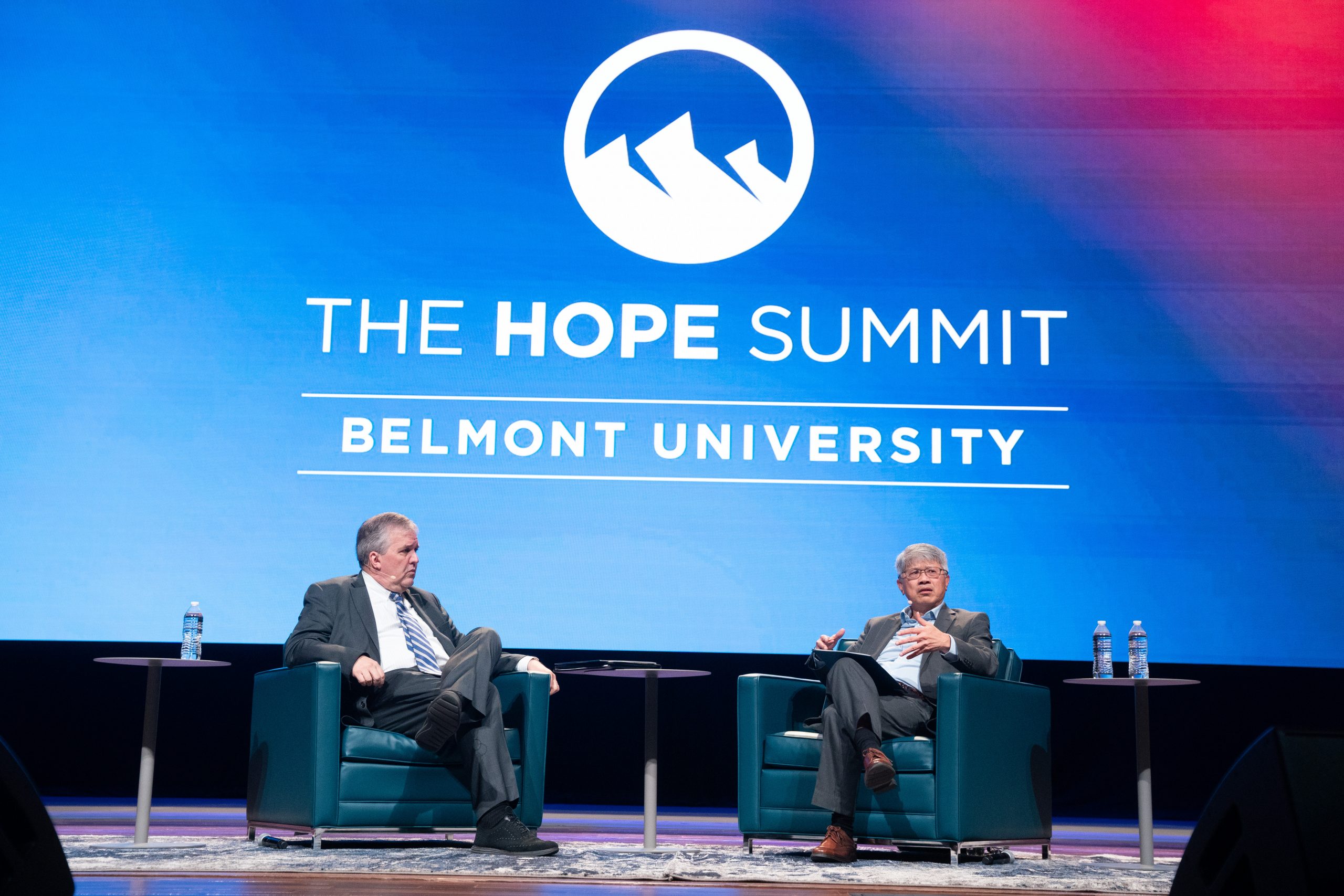
These opportunities continue to forge stronger and deeper connections among all members of an ecosystem–social enterprises, universities, funders, entrepreneurs and more–across the regions and around the world.
Belmont’s work in this space is significant and only growing. At the Hope Summit, the University announced a new partnership with the Transformational Business Network (TBN) to launch the TBN Global Alliance, a worldwide network of impact investors and entrepreneurs who are actively building social enterprises that care for vulnerable communities and transform lives. Together, Belmont and TNB will further human flourishing by working alongside a large and diverse array of independent enterprises, individual and institutional investors, capacity-building organizations and academic researchers to promote and establish scalable enterprise solutions to poverty.

STORY STUDIO: Innovation Through Story
One of Belmont’s Strategic Pathways to 2030 is focused on storytelling– developing and sharing stories of truth, beauty and goodness in the world. We know that stories hold so much power, and Belmont is deeply committed to building upon its foundation as a creative community to continue to leverage the power of this medium to transform lives in significant ways.
The Story Studio is one way the University is moving toward this goal. This new initiative, designed to help cultivate a sense of imagination, is the perfect intersection of innovation and storytelling–focused around developing moments of impact, learning and connection. Story Studio will center diverse narratives in curriculum and throughout Belmont’s community work, partnering with the Data Collaborative to incorporate data into storytelling and elevate the impact of every story that’s told.
EDUCATIONAL INNOVATION: Innovation in Corporate Learning
Nashville is a leader in many industries–and with major corporations making the transition to the city so frequently, there is a role for higher education to play as a key partner.
Belmont has seen this opportunity and is leveraging its prowess for both innovation and education to answer the call. In 2022, Belmont launched its Division of Educational Innovation, expanding the University’s capabilities in online programming, and taking the call even further to develop custom solutions for corporate educational needs. The division includes Belmont Online, which promises digital courses, credentials, certificates and continuing education opportunities, as well as Belmont Executive Education, which provides in-person and virtual custom programs, executive coaching services and a variety of professional development options.
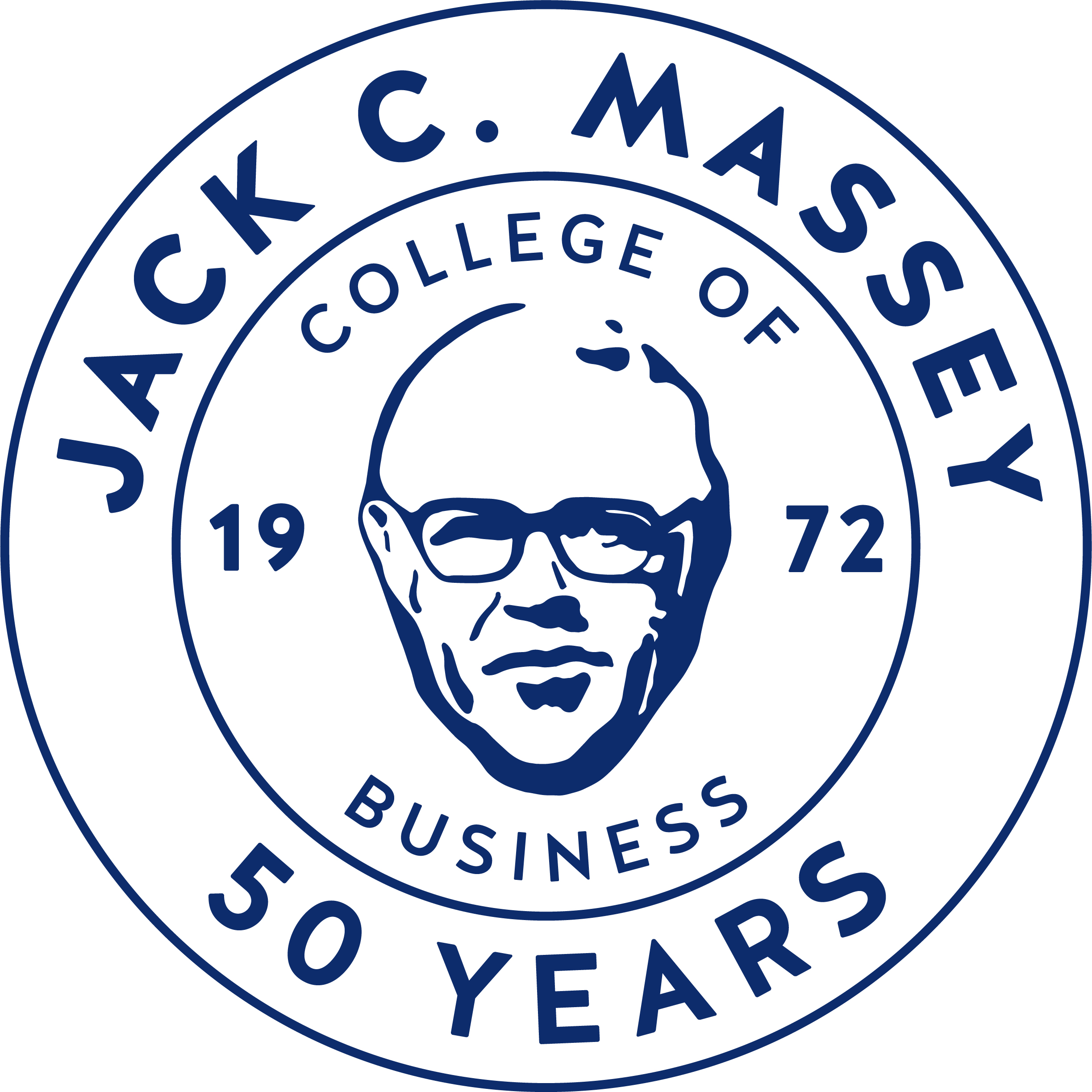
MASSEY CENTERS OF EXCELLENCE: Innovation in Teaching
In addition to the incredible innovation found through new initiatives, labs and partnerships, Belmont has long been known for innovation in teaching and in the classroom. Now celebrating its 50th year, the Jack C. Massey College of Business is one prime example of this legacy.
In 1968, Mr. Massey–a world-renowned entrepreneur and venture capitalist who was the first person to take three different companies public–shocked the then-Belmont College administration when he announced a multi-million dollar gift that would fund a state-of-the-art business program. “Talk about a game changer,” said Dr. Bill Troutt, former Belmont president and Massey mentee. “He was the game changer for Belmont University.”
The College’s 50th anniversary celebrates its success, as well as the example of its namesake. Jack C. Massey was innovation personified–his influence has guided the direction of the College since its founding and continues to lead to the incredible outcomes we see today, many of which are directly connected to the Massey Centers of Excellence.
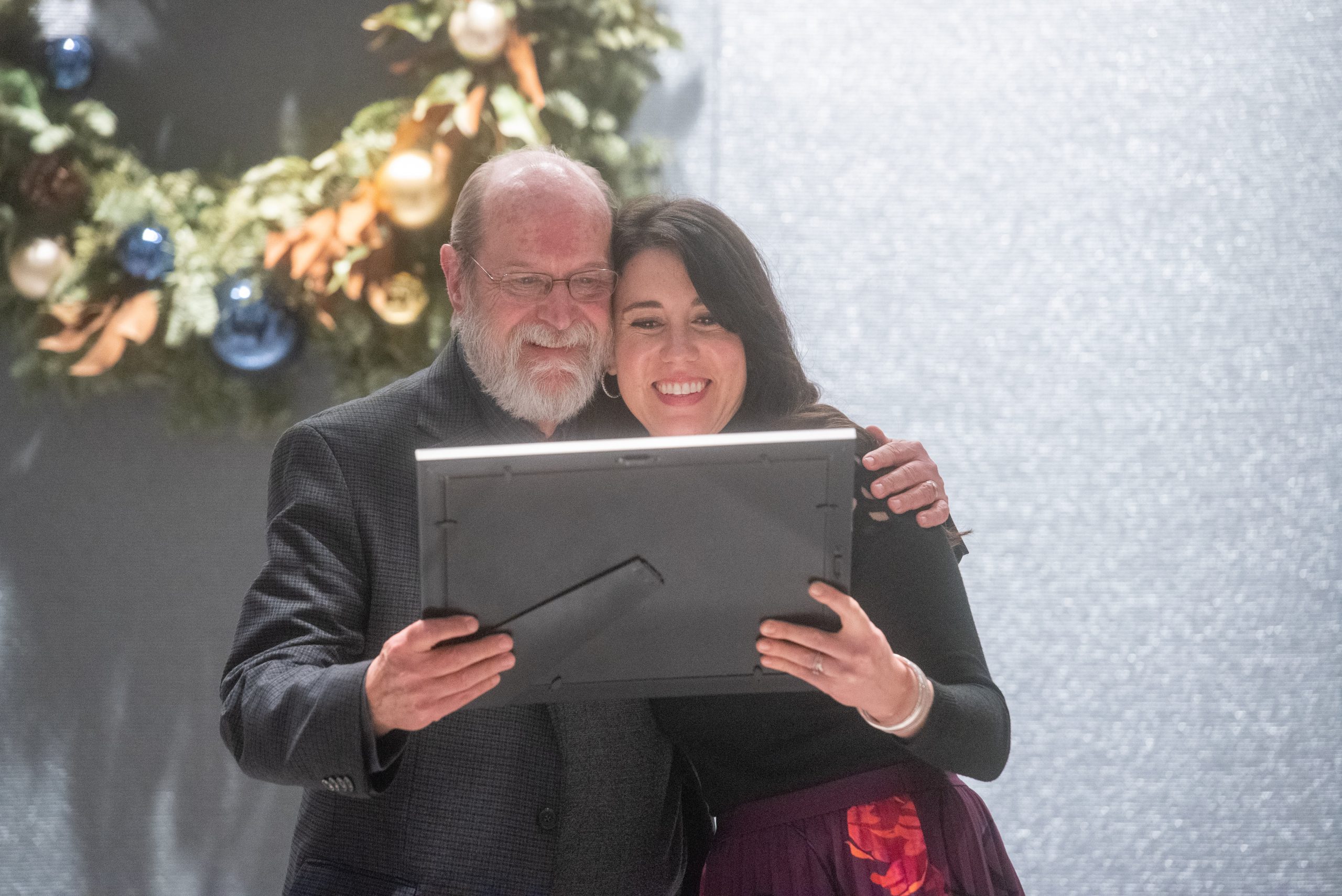
The Thomas F. Cone Sr. Center for Entrepreneurship, named for another business leader known for his creativity and character, empowers students across disciplines with an entrepreneurial mindset and cultivates the competencies to build and deploy innovative and transformative ideas. Established in 2003, the Center provides mentorship, resources, workshops, seed funding and support to students from all majors across Belmont’s campus who are interested in incubating their businesses.
And this innovation continues to be recognized. This year, Belmont’s Entrepreneurship program was ranked No. 1 in Tennessee, No. 5 in the South and 26th overall by rankings released by The Princeton Review for Entrepreneur magazine. Belmont has ranked in this list’s Top 30 over the last five years and has yielded 105 alumni-started companies in the same time.
“Entrepreneurship is woven across campus to engage all students,” said Elizabeth Gortmaker, director of the Cone Center. “Whether someone is starting with an idea or actively growing their business, we have the tools to guide them to success. We are equipping students with entrepreneurial skills, data literacy, a redemptive mindset and the space they need to become a force for positive change.”
Massey’s Center for Social Entrepreneurship, launched by Dr. Bernard Turner in 2008, paves the way for new generations of social entrepreneurs who are interested in employing business skills to transform communities. Belmont was home to the country’s first undergraduate degree in social entrepreneurship and continues to forge ahead with countless innovative steps that meaningfully impact both students and the broader community.
Belmont’s student chapter of Enactus, which brought home the world championship trophy in 2012, continues to engage students in business incubation. This network of leaders teaches students how to use business as a catalyst for positive social and environmental impact. To date, many successful alumni-run social enterprises that are making an impact in the lives of others were incubated in either the Center for Social Enterprise or through Enactus projects.
Both Centers join three others–the Thomas W. Beasley Center for Free Enterprise, the Center for Global Citizenship and the Edward C. Kennedy Center for Business Ethics–in providing innovative and meaningful educational opportunities for students, allowing learners to develop solutions on campus to significant community challenges.
Of course, innovation isn’t confined to the business school and can be seen across Belmont’s highly creative campus. The University’s School of Nursing, long a leader in healthcare education, recently celebrated its 50th anniversary and honored 50 outstanding alumni who are leaders in their field. Since its inception, the School has produced nearly 4,000 alumni who continue to champion better health and well-being for the myriad communities in which they serve.
In addition, Belmont is incredibly well known academically for being the home of the first freestanding school focused on the entertainment industry, the Mike Curb College of Entertainment & Music Business. The music business program– Belmont’s largest major that boasts an alumni base that reads like a Who’s Who of Grammy winners, songwriting legends and leaders onstage, backstage and throughout the industry–will celebrate its own 50th anniversary in 2023-24.

For organizations to truly incubate innovation, there must also be an emphasis on collaborating across Colleges, teams and units to pull strengths and ideas from a variety of areas. BASIC—the Belmont Accelerator for Social Innovation Collaboration—is another example of the power of such collaboration.
Launched in 2021, BASIC promises to encourage and empower faculty, staff and students across Belmont’s campus to use their intellectual capital and faithful commitment for the betterment of our community and beyond.
“For us to be a catalyst for hope in Middle Tennessee, we need to be frontrunners in the quest for innovative solutions to complex social problems,” said Greg Jones. “We can work to creatively address these problems–issues that are so pervasive that they require intense collaboration and experimentation across a variety of sectors.”
Complex problems like intergenerational poverty or lack of educational opportunity, to health care inequities and drug abuse require interdisciplinary thinking and diverse perspectives. As such, BASIC projects involve at least 2-3 disciplines across Colleges and include faculty, staff and student participants.

Since the program was announced, a series of BASIC projects have launched including:
- Flourishing for Immigrant and Refugee Families: Faculty and staff from six disciplines collaborating to address food insecurity, workforce development and community wellness with The Branch in Antioch
- Two-Generation Engagement to Address Barriers to Thriving: Social Work and Education faculty working alongside Belmont’s Community Relations staff to partner with neighborhood organizations for academic, arts and wellness enrichment in the nearby Edgehill community
- Community Health Assessment and Improvement in Rural Tennessee:
Public Health, Exercise Science and Pharmacy faculty collaborating with the Tennessee Department of Health to provide public health toolkits for Middle and West Tennessee counties - Music and Arts Access for Nashville Youth: Music and Marketing faculty bringing together schools, musicians and community organizations in Nashville to enhance mentorship and music
- Reducing Financial Exploitation for the Working Poor: Economics and Law faculty working to create opportunities for the unbanked in Nashville

This solution incubation model allows teams of individuals who are interested in solving a significant and complex problem to come together, offer their expertise, pool their resources and develop scalable ways to improve human flourishing.
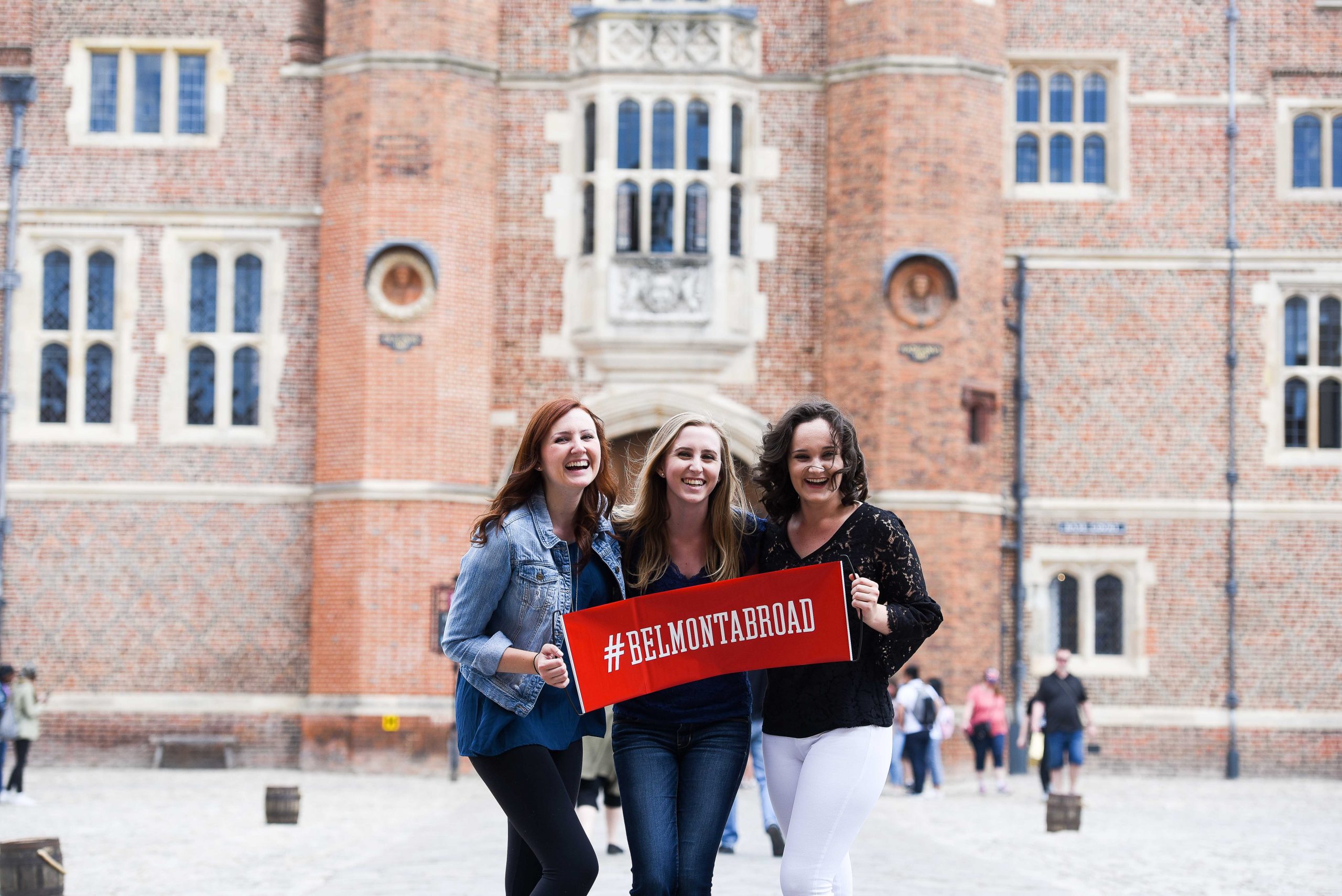
These projects–and more–build upon Belmont’s rich legacy of innovation, adding and extending capabilities for partnership, research and engagement. Belmont finds opportunities to innovate in every facet of campus: through teaching, data, storytelling, corporate learning and more.
By asking hard questions and working collaboratively, the University has a lasting impact on the lives of students, faculty and staff. With passion, creativity and a willing spirit, Belmont continues to build a platform that enables and empowers the community to serve as Agents of Hope, eager and excited to tackle today’s most complex problems, at home and around the world.
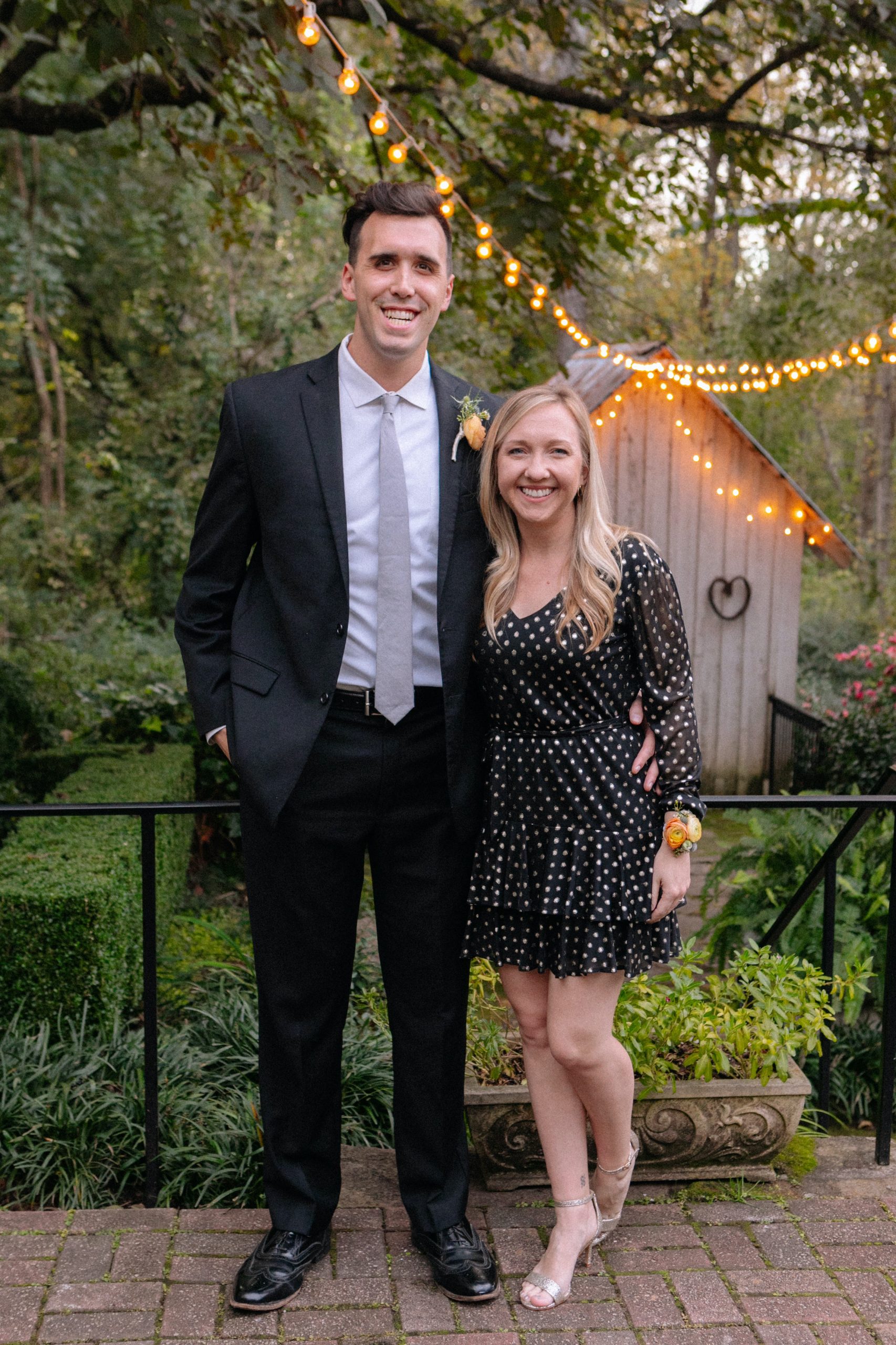
LUMOS: Innovation Through Travel
Established in 2010 from the generosity of Belmont donor and long-time supporter Cynthia Leu, the Lumos Travel Award provides a different kind of innovation incubator for Belmont students. Known as a “working adventure,” this experience is offered to recent graduates of Belmont who are interested in investing themselves and their skills into a community where they will live, serve and work for at least two months.
Since its inception, Lumos has funded experiences for 68 participants in more than 31 countries. With each trip designed intentionally by the student traveler, Lumos empowers travelers to explore, engage and immerse themselves in local communities to deepen their understanding of an issue, project or idea.
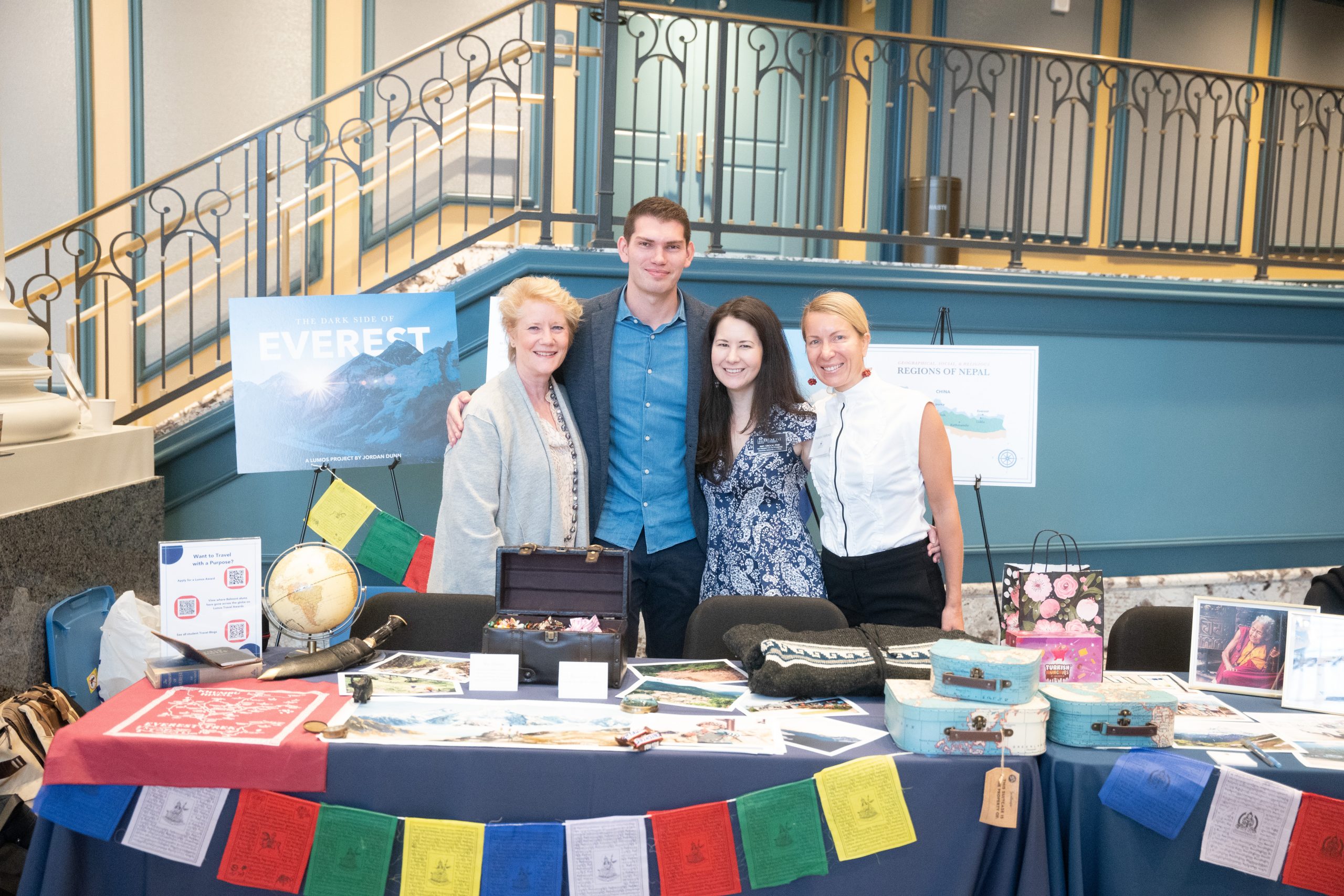
Two travelers–alumni Eric Taft (social entrepreneurship, ‘12) and Hilary Hambrick Taft (business administration, ‘13) – took advantage of this opportunity to explore a different culture and engage with local communities in a meaningful way, together. The couple was newly engaged when they applied to travel on the funded gap year and was married for just two months when they took off to Guatemala to work with a family-run rural community development center in Chimaltenango, about 45 minutes outside of Guatemala City, called Centro Monte Cristo.
While there, the couple worked with the team to start a new business– Queen Bee–and a school. “They came up with the name, they came up with the logo,” said Eric. “Then that grew into us making hundreds of units a month and selling those in 15 stores across the country. That moved them away from some of the industries that were common in Guatemala, like making textiles or carpentry, furniture, catering,” shared Hilary. Now, a decade , those businesses are still running profitably, as well as contributing to the education, nutrition and healthcare of people in that village.

